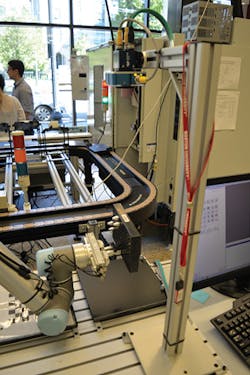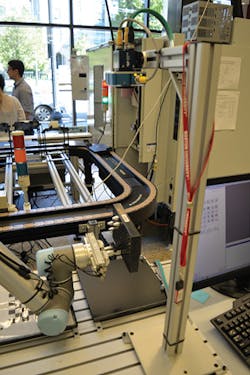Engineering education: Smart camera helps equip students for success
To better equip graduates for success in modern manufacturing environments, the College of Engineering at Boston University (Boston, MA, USA; www.bu.edu), upgraded its Ebner Automated Design and Manufacturing Facility (ADMF), part of the Engineering Product Innovation Center, last year. The center includes multiple robotic arms, Computer Numerical Control (CNC) machines, and a vision station anchored by a BOA smart camera with embedded iNspect software from Teledyne DALSA (Waterloo, ON, Canada; www.teledynedalsa.com).
The ADMF is integral to the Mechanical Engineering Department's Automation and Manufacturing Methods class, which introduces students to concepts and practices of modern manufacturing, including digital imaging and machine vision. "In the Automation and Manufacturing Methods class, a comprehensive series of laboratory exercises gives students practical experience," explains Peter Zink, mechanical engineering lecturer and research assistant professor at Boston University. "BU's College of Engineering offers a unique concentration in manufacturing, and hands-on opportunities with this equipment provides skills in high demand."
Before integrating the BOA smart camera into the ADMF, the facility relied on a simple web camera to perform 'inspections' of the final products generated during each lab exercise, according to Zink, which was not typical of what students would see in state-of-the-art manufacturing environments. Today, Teledyne DALSA's vision system supports the inspection and quality control components of each lab exercise. For example, in one lab exercise, students leverage the ADMF's CAD software to develop a program in which a UR5 robotic arm operates a CNC mill to cut the letters "BU" into a rectangular block. The block is made up of two horizontal sections of colored plastic, and the objective is to cut deeply enough that the lighter color at the bottom serves as the background for the letters.
As each block is completed, the vision system validates the quality and measurement of each cut, checking for flaws. In a second part of the exercise, blocks are sorted onto pallets based on whether they have passed or failed the inspection. Each pallet is marked with a barcode, and students use the vision system's barcode reader to ensure accuracy.
In a second lab exercise designed to demonstrate statistical process control, robots are programmed to print a student's name on a sheet of paper with a rubber stamp. The process is repeated dozens of times and the vision system captures an image of each print and completes an analysis to ensure that the resulting "splotch" is within the normal variation expected with the program.
A third lab exercise teaches statistics as students write a program to estimate results. When a robot repeatedly rolls a pair of dice, the vision system reads the numbers off the dice, then calculates and presents the total.
"The BOA smart camera's small, flexible footprint and 'smart' capabilities-self-contained in one package-make it ideal for our environment," Zink says. "It's very efficient to operate and is incredibly fast: in the lab exercise that uses dice, the dice have barely stopped moving when the camera provides the total. Thanks to Teledyne DALSA's donation, our students are gaining experience with cutting-edge vision technology. When they enter a real-world manufacturing environment and an employer asks them to increase efficiency or reduce the defect rate on a manufacturing line, the technology will be familiar enough to them that they will know where to start."
The first 50 students to take advantage of Teledyne DALSA's BOA smart camera in the Automated Design and Manufacturing Lab recently graduated, joining past graduates at companies like L'Oréal, Tesla, Electric Boat, Saint-Gobain, General Electric, and others.
"It would be impossible to build an entire factory on campus, but we are able to expose students to common factory elements so that our graduates will be familiar with challenges they might encounter on any factory floor," Zink concludes. "We're grateful that Teledyne DALSA was able to provide us with the BOA smart camera with iNspect software, which has already helped students gain experience in using machine vision technology in a contemporary manufacturing environment."
About the Author

John Lewis
John Lewis is a former editor in chief at Vision Systems Design. He has technical, industry, and journalistic qualifications, with more than 13 years of progressive content development experience working at Cognex Corporation. Prior to Cognex, where his articles on machine vision were published in dozens of trade journals, Lewis was a technical editor for Design News, the world's leading engineering magazine, covering automation, machine vision, and other engineering topics since 1996. He currently is an account executive at Tech B2B Marketing (Jacksonville, FL, USA).
B.Sc., University of Massachusetts, Lowell

